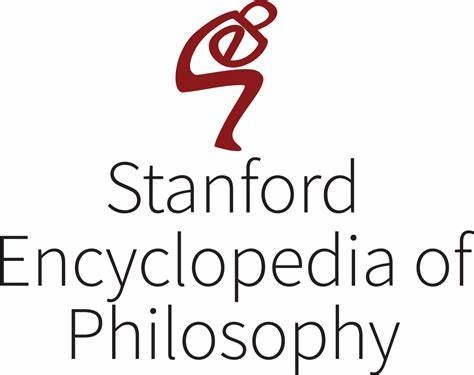Stanford encyclopedia of philosophy (website)
Subject: Philosophy
Type: Website
Where: plato.stanford.edu
Co-principle editors: Edward N. Zalta and Uri Nodelman

How long is it?
There are nearly 1800 entries.
Is it easy to understand?
There may be words that you do not know the meanings of and this could make it difficult to follow for some people.
Who is it for?
It is for anyone who wants to learn more about philosophy.
How recent is it?
The Stanford Encyclopedia of Philosophy project began in 1995 and continues to develop to this day.
A
actualism
actualism and possibilism in ethics
adaptationism
agnosticism and atheism
altruism
anarchism
animalism
anti-realism
Aristotelianism
atheism and agnosticism
atomism
B
behaviourism
Buddhism
C
causal determinism
Chinese Confucianism
cognitivism vs. non-cognitivism
colonialism
communitarianism
compatibilism
Confucianism
consequentialism
conservatism
constitutionalism
constructive empiricism
constructivism
contextualism
Continental Rationalism
contractarianism
contractualism
cosmopolitanism
creationism
D
Daoism
Darwinism
deductivism in the philosophy of mathematics
determinism
dialetheism
dualism
E
egalitarianism
egoism
empiricism
epiphenomenalism
essentialism
existentialism
externalism
externalism about the mind
F
fatalism
federalism
fictionalism
fideism
formalism
four dimensionalism
functionalism
H
haecceitism
hedonism
humanism
I
idealism
incompatibilism
individualism
intuitionism
L
legal positivism
legal probabilism
liberal feminism
liberalism
libertarianism
logical empiricism
logical pluralism
logicism and neologicism
M
materialism
meaning holism
mechanism in science
methodological holism in the social sciences
monotheism
moral anti-realism
moral cognitivism vs. non-cognitivism
moral generalism
moral intuitionism
moral naturalism
moral non-naturalism
moral particularism
moral realism
moral relativism
moral sentimentalism
moral skepticism
multiculturalism
mysticism
N
nationalism
naturalism
Neo-Daois
neo-Kantianism
neoliberalism
Neoplatonism
neutral monism
nominalism
non-naturalism
O
occasionalism
operationalism
P
pacifism
panentheism
panpsychism
pantheism
paternalism
patriotism
perfectionism
personalism
physicalism
Platonism
pluralism
political realism
possibilism-actualism debate
postmodernism
pragmatism
predictivism
presentism
psychologism
Pyrrhonism
Pythagoreanism
R
rationalism vs. empiricism
realism
reism
relativism
republicanism
rule consequentialism
S
scepticism
scientific pluralism
scientific realism
semantic holism
sentimentalism
skeptical theism
skepticis
socialism
Stoicism
structuralism
structural realism
syllogism
T
Taoism
terrorism
theism
transcendentalism
U
universal hylomorphism
utilitarianism
V
vegetarianism
voluntarism
*The Stanford Encyclopedia of Philosophy has nearly 1800 entries, so this is just a small sample of what to expect.
My thoughts…
In order to decide which entries of the Stanford Encyclopedia of Philosophy to read, I went to ‘Browse’, clicked ‘Chronological’ and scrolled through a list of entries. I found one titled Creativity and decided to read it. Here are my thoughts:
Is creativity a virtue?
If nothing more, a virtue is a trait that is good or valuable. Creativity, although it could be
used immorally, certainly has the potential to create valuable products.
However, many philosophers believe that there is a lot more to virtuous traits than this.
Aristotle thought that for actions to be virtuous, the person doing them must know that they
are doing virtuous actions and choose them “from a firm and unchanging state”. I think
creativity sometimes adheres to these criteria, but not always. Aristotle’s conditions would
require a person’s creativity to persist throughout their lives in order to count as a virtue, so
inconsistent creativity is not virtuous. Furthermore, people are often motivated by external
factors such as praise and financial gain when choosing to be creative. This opposes
Aristotle’s criterion that a virtuous action must be done “for its own sake”, making it another
situation in which creativity is not a virtue. Any creativity which occurs unintentionally must
also be discredited.
So what about deliberate and enduring creativity that is demonstrated purely as a result of
intrinsic motivation? In my opinion, the fact that such a detailed distinction must be made
between two theoretical types of creativity suggests that it is not truly a virtue at all. In
contrast, we can say that generosity is a virtue because only consistent and selfless
generosity is true generosity. But we cannot say that a poem was not creative just because
it was written with fame in mind, or because the writer only wrote one poem in their life.
Therefore, creativity is not a virtue in the Aristotelian sense because it does not align with the
definition of virtuous actions.
Can computers be creative?
I think there is an important difference between a computer that appears to be creative and a
computer which is truly creative. There are plenty of computers out there which behave as if
they were creative. The computers only have to produce things which are both new and
valuable.
However, to be genuinely creative, computers must meet more criteria. There is no
consensus as to what these criteria ought to be, however many theorists assert that a
creative process must be surprising, original, spontaneous and/or new. First of all, I think that
computers can be surprising. For example, the chess grandmaster must have been unable
to predict the moves of the computer that defeated him. Also, current technologies are
continuously developing and increasingly show the potential of spontaneity. As for the
concept of novelty, this is clearly possible, as computers have created countless new pieces
of music, writing and artwork.
So what about originality? It is difficult to say whether computers are capable of being
inventors of entirely unique things. I think that the answer will become more clear in the
future, but currently it is neither a definite yes or no. Anyhow, even without consciousness,
understanding and intention, computers seem to be able to fulfil many of the requirements of
a creative process. For this reason, I believe computers can be creative but that we
shouldn’t expect them to operate in the same way as the human brain. A computer’s creative
process doesn’t have to be exactly like ours in order to contribute to the world.
